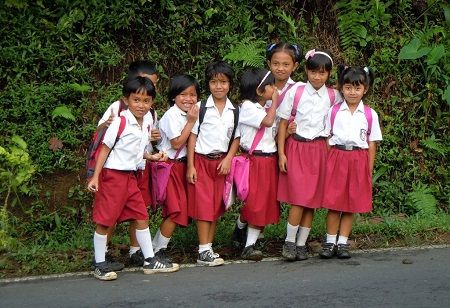- Indonesia’s Constitutional Court rules that free basic education must cover both public and private schools, not just state-run institutions
- Court directs government to create funding or subsidies for qualified private schools to ensure equal access, especially where public schools are unavailable
- Ruling stems from JPPI’s judicial review arguing the 2003 Sisdiknas Law excluded private school students from free basic education guarantees
The government is required to ensure free elementary education in both public and private schools, the Constitutional Court has ruled in its decision on a judicial review against the 2003 National Education System (Sisdiknas) Law lodged by an education watchdog.
During a hearing, court justices read their conclusion that the implementation of Article 34 paragraph 2 of the 2003 law, which stipulates that basic education should be free of charge, was not inclusive of all as it has only been applied to public schools.
In the Sisdiknas Law, the basic education level covers elementary and junior high school, including their equivalent in madrassas.
The justices pointed out that even though the government was funding in order to offer free education in state primary schools, it did not factor in the fact that these schools had limited space, resulting in many students having to attend private schools that are not free. Such an action, the court continued, contradicted the state's responsibility as enshrined in law.
"The state should adopt a basic education funding policy that embraces students at public, private, and madrassas, through financing instruments or subsidies, so that there will be no gap in access to basic education", Justice Enny Nurbaningsih read out in the ruling.
Free basic education, the justice went on, is included in the economic, social and cultural rights of the citizen that can be realized "gradually, selectively and affirmatively without being discriminatory" based on the capacity of the state.
But the court justices recognized that there are private schools with extra curricula beyond that mandated by the government, i.e., international or religious schools. The government should not compel these schools to offer free education to their students, whose parents have knowledge of the tuition fee of enrolling in such schools, Enny stated.
Given the limited ability of the state to finance students for their basic education, Justice Enny recommended that the government prepare a funding plan that would give primary consideration to basic education needs in private schools that meet the qualifications for such funding.
The court likewise called for private schools to assist in mitigating tuition fees for their students, particularly in "areas where there are no state-funded schools around".
The judicial review petition against the 2003 Sisdiknas Law was filed in December 2023 by the Network for Education Watch Indonesia (JPPI). The plaintiff challenged the word of compulsory basic education at least in the basic level without any charges" under Article 34 paragraph 2 of the law and argued that the same should also be applicable for students in private schools.

